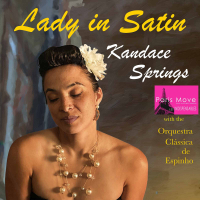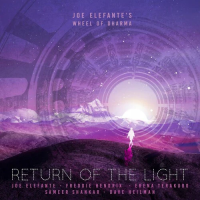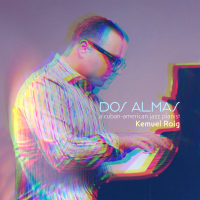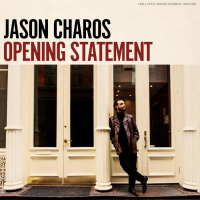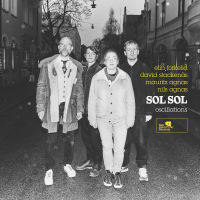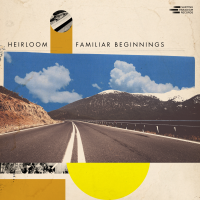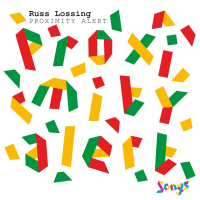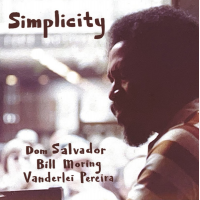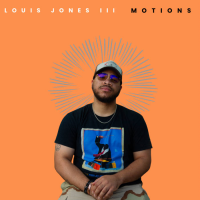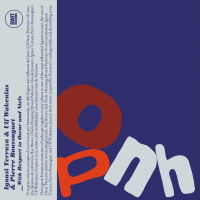Home » Jazz Articles » Extended Analysis » Donald Fagen: The Nightfly Trilogy
Donald Fagen: The Nightfly Trilogy
Though Becker and Fagen's pre-Steely Dan stint as staff songwriters for ABC/Dunhill in Los Angeles was more in line with their aspiration to be professional songwriters (as opposed to performing musicians) a la New York's The Brill Building, producer Gary Katz's suggestion that they form a band to record their songs ended up turning them into a group with an identity. Still, after Steely Dan's tour in support of Pretzel Logic (MCA, 1974), the group was disbanded and Steely Dan became a studio-only group, with Becker and Fagen developing a reputation as perfectionists who were prepared, after conducting sessions with a particular line-up, to discard the sessions entirely and start again from scratch.
Subsequent Steely Dan albums, most notably the outstanding triptych of The Royal Scam (MCA, 1976), Aja (MCA, 1977) and Gaucho (MCA, 1980), may have been created from lengthy sessions with a seeming cast of thousands, but what made them so successful and, thirty-plus years on, so enduring, is how they combined sharp lyrics, uncompromisingly sophisticated music that had as much to do with jazz as it did pop, and undeniable groove. One can accuse Becker and Fagen of being perfectionists, and the music certainly sounds flawless; but equally, there's none of the sterility one might expect from work of such consideration and detail.
The Dan disbanded after Gaucho—though it would reconvene for tours with various line-ups in the 1990s, releasing Alive In America (Giant, 1995) and studio records beginning with the Grammy Award-winning Two Against Nature (Giant, 2000). But in the intervening years between Gaucho and Alive In America, Fagen released two albums under his own name—the critically acclaimed The Nightfly (Warner Bros., 1982) and less well-received but equally superb Kamikiriad (Reprise, 1993). In the midst of revived Dan activity, Fagen released his last album, Morph The Cat (Reprise) in 2006, winning a Grammy for Best Surround Sound Album. While it was well-deserved, it's a shame the disc was recognized for how good it sounded rather than how good the music was.
While there's really nothing conceptual to link Fagen's three solo albums together, there are differentiators that distinguish the music from Steely Dan. The sleek production values are similar and, while Fagen's pencil could hardly be called anything remotely resembling dull, a defining characteristic of Steely Dan's lyrics has always been an acerbic and, at times, idiosyncratic wit. Fagen's lyrics are no less cryptic, but there's a greater romanticism, even as he continues to demonstrate a unique way of turning a phrase.
But what makes Fagen's albums not Steely Dan records (despite the participation of Becker on Kamikiriad as producer, bassist/lead guitarist and co-writer of one tune), and ties them together as a small but significant body of work, is an even greater jazz-centricity than found on most Steely Dan albums, making the bringing of the three titles together as The Nightfly Trilogy a logical move.
Those who already own the three albums may wonder what this box set can possibly offer. By making each of the three releases a double-disc set—one disc a traditional CD, the other an MVI (Music Video Interactive) DVD disc with 5.1 surround and uncompressed PCM Stereo mixes, bonus audio and video tracks, complete lyrics and more—plus an added CD with all ten bonus audio tracks from the MVI discs, The Nightfly Trilogy represents the definitive versions of all three discs, plus nearly fifty minutes of additional music including demos, live material and songs found in film soundtracks.
The MVI discs also feature complete liner notes, including newly-written material by Fagen, complete track-by-track musician credits, ringtones, photos, and 192Kbps files that can be downloaded in seconds for use with an MP3 player. In a time where illegal downloads are taking a chunk out of CD sales, with MVI the label is clearly aiming to provide a wealth of features that wouldn't be available otherwise. The individual discs have no printed liner notes or credits, so the only place to get the information is on the MVI disc. And with portable DVD players becoming more prevalent along with home theater sound systems, the MVI versions of the albums become very attractive. It's an intriguing approach; only time will tell if it's one that will draw at least some percentage of the music listening public back to hard media.
The only complaint is that the CD versions of the music (which are clearly the source for the MP3 download format) are not remixed, remastered or even sonically equalized across the box. This means that if you grab the MP3 files and pop them onto your MP3 player, the bonus tracks at the end of each release (three on The Nightfly, four on Kamikiriad and three on Morph The Cat are at significantly different levels, though in order to flow together on the bonus CD, the levels of the extra tracks are normalized. The best approach is to rip the audio files from the bonus CD and have them as a separate album on your MP3 player. There will still be level differences from one disc to the next, but at least there will be consistency within each.
While there are certain markers that date most albums—in particular, production values including how drums are recorded and period-specific synthesizer tones—listening the The Nightfly it becomes clear just how undated the album is, with the same applying to Kamikiriad and Morph The Cat. Fagen's music, rather than sounding of any particular time, seems to feel comfortable in any post-1970s period, but its especially true of The Nightfly, with its avoidance of the cheesy synthesizer tones that now dates so many 1980s albums.
There are some who believe that the best pop music is played by musicians with a jazz background, and there's plenty of support for that on The Nightfly. Fagen has always made astute choices, picking some of the best jazz/session players of the time, and there are some remarkable performances here. The line-up includes bassists Anthony Jackson, Abraham Laboriel and Marcus Miller, drummer Jeff Porcaro, a horn section featuring trumpeter Randy Brecker and saxophonist Michael Brecker, and guitarists Larry Carlton and Steve Khan. Carlton, by this time, had already established a reputation for concise solos, making only a few bars mean far more than an extended solo ever could. His fills and solos on the bright "Green Flower Street" and "New Frontier," and the funkier title track, are marvels of economy and construction, as relevant today as they were a quarter century ago.
The Nightfly's conceptual premise is a look back to the culture—popular and political—of the 1950s, with the title track's tender look at the importance of radio now especially poignant, given that medium's decreasing importance in getting new music heard. The lyrics represent a departure for Fagen in terms of content; but the music—while recognizable as coming from the Steely Dan space—is still distanced. "Walk Between Raindrops" swings in a way The Dan never has, "The Goodbye Look" has an unexpected Caribbean vibe, and "Maxine" is a pure jazz ballad, albeit one with a backbeat that features some of Fagen's most lush vocal arrangements, and a brief but soulful tenor solo from the late Michael Brecker.
The three bonus tracks help complete the picture of 1980s Fagen. "True Companion," from the soundtrack to the movie Heavy Metal (1981), is a largely instrumental track that features a terrific performance by Steve Khan on both acoustic and electric guitars. "Century's End," from the soundtrack to Bright Lights, Big City (1988), is a piece of greasy funk that features the same synth harmonica that Fagen uses on The Nightfly's opener, "I.G.Y." A live version of "Green Flower Street" is taken from Fagen's New York Rock & Soul Review album, Live At The Beacon (Giant, 1991), and while Fagenâ's group of the time didn't have the star power of the musicians who played on the studio version, it proves he had the ability to put together a top notch live band—and that he'd gotten over the aversion to live performance that turned Steely Dan into a studio band for most of its career during the 1970s.
The MVI disc also features videos for "New Frontier" and "Century"s End."
Kamikiriad also had a concept, this time looking into the near future rather than the near past. The songs revolve around a road trip in Fagen's new titular car and, while it didn't get the same critical reception as The Nightfly, time has proven it to have its own unique charms.
With Walter Becker in the producer's chair, in addition to playing bass and lead guitar, one significant change from The Nightfly is the presence of a core group that, with the exception of the drum chair being shared by Leroy Clouden, Christopher Parker and Dennis McDermott, remains consistent throughout the album's eight tracks. Another is that the tracks are, on average, longer—none less than five minutes and one, the ballad "On the Dunes," over eight. Longer solo sections and lengthier fades could be criticized as excessive, but the grooves are so compelling that none of the songs ever overstays its welcome.
Harmonically, Kamikiriad may be even more complex than The Nightfly, with sharper horn and vocal arrangements. While there's nothing about any Fagen (or Dan) album that could be considered raw, and it's an exercise in futility to try counting the number of individual tracks used on any song, Fagen's ability to create arrangements rich in texture but never cluttered is in sharp contrast to others, for whom the infinite possibilities of the studio result in "kitchen sink" albums, where it's clear that they simply throw ideas at a track, hoping some of them will work.
The Kamikiriad MVI disc features twenty minutes of bonus tracks. "Big Noise New York" is a demo from 1994, originally written for filmmaker Spike Lee. It's a window into Fagen's writing process, with only Fagen layering synthesizers, drum programs and vocals. If his demos are this complete, it's no surprise that finished songs on his albums sound so full. "Confide In Me," a lively shuffle, is a publishing demo from 1994, but this time with a group of live players who were be part of the Live At The Beacon group—organist Jeff Young, guitarist Drew Zingg, bassist Lincoln Schleiffer and drummer Dennis McDermott. "Blue Lou" is an instrumental written for the film Glengarry Glen Ross (1992), with the Frank Roccisano Orchstra and ace session saxophonist Lou Marini. "Shanghai Confidential," another instrumental, was written for a dance troupe directed by Marianne Bachmann. A rare occasion where it's dated by the drum program, it's still a solid feature for guitarist Steve Khan, with a band that also includes bassist Marcus Miller and percussionist Manolo Badrena.
Videos of "Tomorrow"s Girls" and "Snowbound" are included, along with a promotional audio interview with Fagen from 1993, for the release of Kamikiriad.
AAJ has already published a number of reviews of Morph The Cat, but in context of The Nightfly and Kamikiriad, it's important to note that, like Kamikiriad, it features a consistent core group, this time with keyboardist Ted Baker, guitarists Jon Herrington and Wayne Krantz, bassist Freddie Washington and drummer Keith Carlock. Sonically it's the best of the three, no surprise given it's a recent recording, but still, the sound literally leaps out of the speakers. it's no surprise that it won the Grammy for Best Surround Sound.
The three bonus tracks include an outstanding, groove-heavy version of Al Green"s "Rhymes," for a planned revue that never materialized with Todd Rundgren as musical collaborator and co-producer. Technologically it demonstrates just how far drum programming has evolved, with a sound so natural and flexible that it's hard to believe it's not being played by a live drummer. "Hank"s Pad" is a swinging retake of Henry Mancini"s "Pete"s Pad," but with added lyrics by Fagen. "Viva Viva Rock "n" Roll" is, not surprisingly, a hard-rocking live track from Fagen's tour in support of Morph, with an uncharacteristically raw vocal performance from Fagen. A World Café interview with Fagen, promoting the album, is also included.
Assessing Fagen's three solo albums, the additional album's worth of bonus material, and his ongoing work with Becker in Steely Dan, there are two lasting impressions. With rare exception, The Nightfly, Kamikiriad and Morph The Cat are all remarkably enduring and fresh; with songs that will continue to sound relevant—and of no particular time—well into the future.
But perhaps most important, these albums, along with the Steely Dan catalogue, represent the craft of songwriting at its best—well-conceived songs with harmonic sophistication and polish far above most pop fare, while not losing sight of a visceral physicality. While there are many fine songwriters at work today, in the realm of popular song there are few writers—with the exception of his partner in Dan, Walter Becker— who embody the spirit and soul of Tin Pan Alley and the Brill Building as well as Fagen; honoring the tradition while bringing it forward into the 21st Century.
Track Listing
The Nightfly
CD: I.G.Y.; Green Flower Street; Ruby Baby; Maxine; New Frontier; The Nightfly; The
Goodbye Look; Walk Between Raindrops. MVI: I.G.Y.; Green Flower Street; Ruby Baby; Maxine; New
Frontier; The Nightfly; The Goodbye Look; Walk Between Raindrops. Bonus Audio: True Companion;
Green Flower Street (Live); Century's End. Bonus Video: New Frontier; Century's End. Complete
lyrics, liner notes credits and ringtones.
Kamikiriad
CD: Trans-Island Skyway; Countermoon; Springtime; Snowbound; Tomorrow's Girls;
Florida Room; On The Dunes; Teahouse On The Tracks. MVI: Trans-Island Skyway; Countermoon;
Springtime; Snowbound; Tomorrow's Girls; Florida Room; On The Dunes; Teahouse On The Tracks.
Bonus Audio: Big Noise New York; Confide In Me; Blue Lou; Shanghai Confidential; Reprise Promo
Interview. Bonus Video: Tomorrow's Girls; Snowbound. Complete lyrics, liner notes credits and
ringtones.
Morph The Cat
CD: Morph The Cat; H Gang; What I Do; Brite Nitegown; The Great Pagoda Of Funn;
Security Joan;
The Night Belongs To Mona; Mary Shut The Garden Door; Morph The Cat (Reprise). MVI: Morph The
Cat; H Gang; What I Do; Brite Nitegown; The Great Pagoda Of Funn; Security Joan; The Night
Belongs To Mona; Mary Shut The Garden Door; Morph The Cat (Reprise). Bonus Audio: Rhymes;
Hank's Pad (Live); Viva Viva Rock 'n' Roll (Live); World Café Interview (2006). Complete lyrics, liner
notes credits and ringtones.
Trilogy: 10 Extras
Rhymes; Big Noise New York; True Companion; Confide In Me; Blue Lou; Shanghai
Confidential; Green Flower Street (Live); Century's End; Hank's Pad (Live); Viva Viva Rock 'n' Roll
(Live).
Personnel
Donald Fagen
piano and vocalsThe Nightfly
Donald Fagen: vocals, synthesizers (CD#1-3, CD#6, CD#8, MVI#1-3, MVI#6, MVI#8), synth
blues harmonica (CD#1, MVI#1), electric piano (CD#3-4, CD#8, MVI#3-4, MVI#8), backup vocals
(CD#3, CD#5-8, MVI#3, MVI#5-8), organ (CD#3-4, CD#8, MVI#3-4, MVI#8), piano (CD#6, MVI#6,
MVI#9), kalimba (MVI#9), melodica (MVI#10), keyboards (MVI#11), sequencing (MVI#11); Greg
Phillinganes: electric piano (CD#1-2, CD#7, MVI#1-2, MVI#7), clavinet (CD#2, MVI#2), piano solo
(CD#3, MVI#3), piano (CD#4, MVI#4), synthesizer (CD#7, MVI#7), synthesizer bass (CD#8, MVI#8); Rob
Mounsey: synthesizers (CD#1-2, CD#6, MVI#1-2, MVI#6); Hugh McCracken: guitar (CD#1, CD#3,
CD#6, MVI#1, MVI#3, MVI#6), harmonica (CD#5, MVI#5); Anthony Jackson: bass (CD#1, CD#3, MVI#1,
MVI#3); James Gadson: drums (CD#1, MVI#1), additional drums (CD#3, MVI#3); Jeff Porcaro: drums
(CD#2-3, CD#6-7, MVI#2-3, MVI#6-7); additional drums (CD#1, MVI#1); Starz Vanderlocket:
percussion (CD#1-2, CD#5, CD#7, MVI#1-2, MVI#5, MVI#7), backup vocals (CD#5, MVI#5); Roger
Nichols: percussion (CD#1, MVI#1); Randy Brecker: trumpet (CD#1 CD#3, MVI#1, MVI#3), flugelhorn
(CD#4, MVI#4); Dave Tofani: alto saxophone (CD#1, CD#4, MVI#1, MVI#4); Michael Brecker: tenor
saxophone (CD#1, CD#3-4, MVI#1, MVI#3-4, MVI#11); Ronnie Cuber: baritone saxophone (CD#1,
CD#4, MVI#1, MVI#4, MVI#11)); Dave Bargeron: trombone (CD#1, MVI#1, MVI#11), euphonium
(CD#4, MVI#4); Valerie Simpson: backup vocals (CD#1-3,CD#6-7, MVI#1-3, MVI#6-7); Zack Sanders:
backup vocals (CD#1-2, CD#6, MVI#1-2, MVI#6, MVI#11), vocals (MVI#9); Frank Floyd: backup vocals
(CD#1-2, CD#6, MVI#1-2, MVI#6, MVI#11); Gordon Grody: backup vocals (CD#1, MVI#1); Larry
Carlton: lead guitars (CD#2-3, CD#5-7, MVI#2-3, MVI#5-7), guitar (CD#4, CD#8, MVI#4, MVI#8); Dean
Parks: guitar (CD#2, CD#7, MVI#2, MVI#7); Rick Derringer: guitar (CD#2, CD#6, MVI#2, MVI#6); Chuck
Rainey: bass (CD#2, MVI#2); Daniel Lazerus: backup vocals (CD#2, MVI#2); Michael Omartian: piano
(CD#3, CD#5, MVI#3, MVI#5), electric piano (CD#5-6, MVI#5-6); Marcus Miller: bass (CD#4, CD#6-7,
MVI#4, MVI#6-7); Ed Green: drums (CD#4-5, MVI#4-5); Abraham Laboriel: bass (CD#5, MVI#5); Steve
Khan: acoustic guitar (CD#7, MVI#7), guitar (MVI#9); Will Lee: bass (CD#8, MVI#8-9); Steve Jordan:
drums (CD#8, MVI#8-9); Leslie Miller: backup vocals (CD#8, MVI#8); Don Grolnick: Fender piano
(MVI#9); Crusher Bennett: percussion (MVI#9); Jeff Young: piano (MVI#10); Drew Zingg: guitar
(MVI#10); Lincoln Schleiffer: bass (MVI#10); Dennis McDermott: drums (MVI#10); Chris Anderson:
trumpet (MVI#10); Cornelius Bumpus: tenor saxophone (MVI#10); John Hagen: tenor saxophone
(MVI#10); Ula Hedwig: backup vocals (MVI#10); Mindy Jonstyn: backup vocals (MVI#10); Dian Sorel:
backup vocals (MVI#10); Georg Wadenius: guitar (MVI#11); Jimmy Haslip: bass (MVI#11); Leroy
Clouden: drums (MVI#11); Lew Soloff: trumpet (MVI#11); Harold Vick: tenor saxophone (MVI#11);
Angela Patrick: backup vocals (MVI#11).
Kamikiriad
Donald Fagen: vocals, keyboards (CD#1-8, MVI#1-8, MVI#12); keyboard sequencing
(MVI#9), backup vocals (MVI#9-10), piano (MVI#10), sequencing (MVI#12); Walter Becker: bass
(CD#1-8, MVI#1-8), solo guitar (CD#1-8, MVI#1-8); Georg Wadenius: guitar (CD#1-8, MVI#1-8); Paul
Griffin: Hammond B-3 Organ (CD#1-8, MVI#1-8); Leroy Clouden: drums (CD#3, CD#5, CD#8, MVI#3,
MVI#5, MVI#8), percussion (CD#1-8, MVI#1-8); Christopher Parker: drums (CD#1-2, CD#6-7), MVI#1-
2, MVI#6-7); Dennis McDermott: drums (CD#4, MVI#4); Bashiri Johnson: percussion (CD#1-8, MVI#1-
8); Randy Brecker: horns, trumpet and flugelhorn (CD#1-8, MVI#1-8); Cornelius Bumpus: tenor
saxophone (CD#1-8, MVI#1-8), tenor saxophone solo (CD#6-7. MVI#6-7); Ronnie Cuber: baritone
saxophone (CD#1-8, MVI#1-8); Illinois Elohainu: tenor saxophone (CD#1-8, MVI#1-8), tenor
saxophone solo (CD#2, MVI#2); Lawrence Feldman: tenor saxophone and flute (CD#1-8, MVI#1-8);
Birch Johnson: trombone (CD#1-8, MVI#1-8), trombone solo (CD#8, MVI#8); Lou Marini: alto
saxophone, flute and clarinet (CD#1-8, MVI#1-8), tenor saxophone (MVI#11); Jim Pugh: trombone
(CD#1-8, MVI#1-8); Richard Rosenberg: baritone saxophone (CD#1-8, MVI#1-8); Alan Rubin:
trumpet and flugelhorn (CD#1-8, MVI#1-8); Dave Tofani: tenor saxophone and flute (CD#1-8,
MVI#1-8); Tim Ries: tenor saxophone (CD#1-8, MVI#1-8); Frank Floyd: background vocals (CD#1-8,
MVI#1-8); Diane Garisto: background vocals (CD#1-8, MVI#1-8); Amy Helm: background vocals
(CD#1-8, MVI#1-8), "You're Not My Jackie" (CD#2, MVI#2); Mindy Jostyn: background vocals (CD#1-8,
MVI#1-8, MVI#10), harmonica (MVI#10); Brenda King: background vocals (CD#1-8, MVI#1-8); Curtis
King: background vocals (CD#1-8, MVI#1-8); Jenni Muldaur: background vocals (CD#1-8, MVI#1-8);
Angela Clemmon Patrick: background vocals (CD#1-8, MVI#1-8); Katherine Russell: background
vocals (CD#1-8, MVI#1-8); Dian Sorel: background vocals (CD#1-8, MVI#1-8); Fonzie Thornton:
background vocals (CD#1-8, MVI#1-8); Jeff Young: organ (MVI#10, MVI#12), backup vocals (MVI#12);
Drew Zingg: guitar (MVI#10); Lincoln Schleiffer: bass (MVI#10); Denny McDermott: drums (MVI#10);
The Joe Roccisano Orchestra (MVI#11); Steve Khan: guitar (MVI#12); Marcus Miller: bass (MVI#12);
Manolo Badrena: percussion (MVI#12).
Morph the Cat
Donald Fagen: vocals, Fender piano (CD#1-2, CD#4, CD#9, MVI#1-2, MVI#4, MVI#9,
MVI#12), backup vocals (CD#1-9, MVI#1-9), piano (CD#6-7, MVI#6-7), organ (CD#6, MVI#6), melodica
(CD#8, MVI#8), melodica solo (CD#8, MVI#8), tambourine (MVI#10); Keith Carlock: drums (CD#1-3,
CD#5-9, MVI#1-3, MVI#5-9, MVI#12); Freddie Washington: bass guitar (CD#1-3, CD#5-9, MVI#1-3,
MVI#5-9, MVI#12); Ken Emerson: guitar (CD#3, MVI#3); Jon Herrington: guitar (CD#1-9, MVI#1-9,
MVI#11-12), guitar solo (CD1#1-2, MVI#1-2), guitar solo - chorus (C#9, MVI#9); Wayne Krantz: guitar
(CD#1-9, MVI#1-10, MVI#12), guitar solo (CD#4-5, MVI#4-5), Hugh McCracken: guitar (CD1#1-3,
CD#9, MVI#1-3, MVI#9); Frank Vignola: guitar (CD1#1, MVI#1), guitar solo - tag (CD#9, MVI#9);
Phonus Quaver: vibraphone (CD#1, CD#5, CD#8-9, MVI#1, MVI#5, MVI#8-9), marimba (CD#1, CD#4,
CD#9, MVI#1, MVI#4, MVI#9); Jerry Barnes: backup vocals (CD#1, CD#5, CD#9, MVI#1, MVI#5,
MVI#9); Michael Harvey: backup vocals (CD#1, CD#6, CD#9, MVI#1, MVI#6, MVI#9); Marvin Stamm:
trumpet (CD#1-2, CD#4-5, CD#7, CD#9, MVI#1-2, MVI#4-5, MVI#7, MVI#9), trumpet solo (CD#5,
MVI#5); Walt Weiskopf: tenor saxophone (CD#1-2, CD#7, CD#9, MVI#1-2, MVI#7, MVI#9-10, MVI#12),
tenor saxophone solo (CD#1-2, MVI#1-2), alto saxophone (CD#4-5, MVI#4-5, MVI#10); Ted Baker:
piano CD#2, CD#5, MVI#2, MVI#5, MVI#11), whirly piano (CD#3, CD#6, MVI#3, MVI#6), Fender piano
(CD#7-8, MVI#7-8); Mark Patterson: trombone (CD#2, CD#5, CD#7, MVI#2, MVI#5, MVI#7); Lawrence
Feldman: clarinet (CD#2, MVI#2), tenor saxophone (CD#4-5, MVI#4-5), flute (CD#7, MVI#7); Roger
Rosenberg: baritone saxophone (CD#2, CD#4-5, MVI#2, MVI#4-5), bas clarinet (CD#7, MVI#7);
Gordon Gottlieb: percussion (CD#2, CD#4, CD#6-8, MVI#2. MVI#4, MVI#6-8); Howard Levy:
harmonica (CD#3, CD#7, MVI#3, MVI#7), harmonica solo (CD#3, MVI#3); Amy Helm: backup vocals
(CD#3, MVI#3, MVI#10), whistling (MVI#10); Carolyn Leonhart: backup vocals (CD#3, CD#8, MVI#3,
MVI#8, MVI#11-12); Cindy Mizelle: backup vocals (CD#3, MVI#3, MVI#12); Mark Patterson: trombone
(CD#4, MVI#4); Bashiri Johnson: percussion (CD#4, MVI#4); Joe Pasaro: percussion (CD#5, MVI#5);
Ken Wessel: guitar (CD#6, MVI#6), guitar solo (CD#6, MVI#6); Jennifer Battista: clapper (CD#6,
MVI#6); Eddie Jackson: clapper (CD#6, MVI#6); Camille Meza: clapper (CD#6, MVI#6); Candice
Predham: clapper (CD#6, MVI#6); Harlan Post Jr. acoustic bass (CD#7, MVI#7); Illinois Elohainu:
flutes (CD#8, MVI#8); Brian Montgomery: remedial bass guitar (CD#9, MVI#9); Todd Rundgren:
keyboards, sequencing and backup vocals (MVI#10); Michael Leonhart: trumpet (MVI#10-12); Larry
Farrell: trombone (MVI#10); Ricky Lawson: drums (MVI#11); Tom Barney: bass guitar (MVI#11);
Victoria Cave: backup vocals (MVI#11); Cindy Calhoun: backup vocals (MVI#11); Jim Pugh: trombone
(MVI#11); Cornelius Bumpus: tenor saxophone (MVI#11); Bob Sheppard: tenor saxophone (MVI#11),
tenor saxophone solo (MVI#11).
Trilogy: 10 Extras
Donald Fagen: vocals, tambourine (1), keyboard sequencing (2), backup vocals (2, 4),
piano (3, 4), kalimba (3), keyboards (6, 8), sequencing (6, 8), melodica (7), Fender piano (10); Wayne
Krantz: guitar (1, 10); Walt Weiskopf: tenor saxophone (1, 10), alto saxophone (1); Amy Helm:
backup vocals and whistling (1); Todd Rundgren: keyboards, sequencing and backup vocals (1);
Michael Leonhard: trumpet (1, 9, 10); Larry Farrell: trombone (1); Zack Sanders: vocals (3), backup
vocals (8); Will Lee: bass (3); Steve Jordan: drums (3); Don Grolnick: Fender piano (3); Crusher
Bennett: percussion (3); Mindy Jostyn: backup vocals (4, 7), harmonica (4); Jeff Young: organ (4, 6),
backup vocals (6), piano (7); Drew Zingg: guitar (4, 7); Lincoln Schleiffer: bass (4, 7); Denny
McDermott: drums (4, 7); Lou Marini: tenor saxophone (5); The Joe Roccisano Orchestra (5); Steve
Khan: guitar (6); Marcus Miller: bass (6); Manolo Badrena: percussion (6); Chris Anderson: trumpet
(7); John Hagen: tenor saxophone (7); Ula Hedwig: backujp vocals (7); Dian Sorel: backup vocals (7);
Cornelius Bumpus: tenor saxophone (7, 9); Ronnie Cuber: baritone saxophone (8), Dave Bargeron:
trombone (8); Frank Floyd: backup vocals (8); Georg Wadenius: guitar (8); Jimmy Haslip: bass (8);
Leroy Clouden: drums (8); Lew Soloff: trumpet (8); Harold Vick: tenor saxophone (8); Angela Patrick:
backup vocals (8); Jon Herrington: guitar (9, 10); Ted Baker: piano (9); Carolyn Leonhard: backup
vocals (9, 10); Ricky Lawson: drums (9); Tom Barney: bass guitar (9); Victoria Cave: backup vocals
(9); Cindy Calhoun: backup vocals (9); Jim Pugh: trombone (9); Bob Sheppard: tenor saxophone (9),
tenor saxophone solo (9); Keith Carlock: drums (10); Freddie Washington: bass guitar (10); Cindy
Mizelle: backup vocals (10).
Album information
Title: The Nightfly Trilogy | Year Released: 2007 | Record Label: Reprise
Tags
PREVIOUS / NEXT
Support All About Jazz
 All About Jazz has been a pillar of jazz since 1995, championing it as an art form and, more importantly, supporting the musicians who make it. Our enduring commitment has made "AAJ" one of the most culturally important websites of its kind, read by hundreds of thousands of fans, musicians and industry figures every month.
All About Jazz has been a pillar of jazz since 1995, championing it as an art form and, more importantly, supporting the musicians who make it. Our enduring commitment has made "AAJ" one of the most culturally important websites of its kind, read by hundreds of thousands of fans, musicians and industry figures every month.









